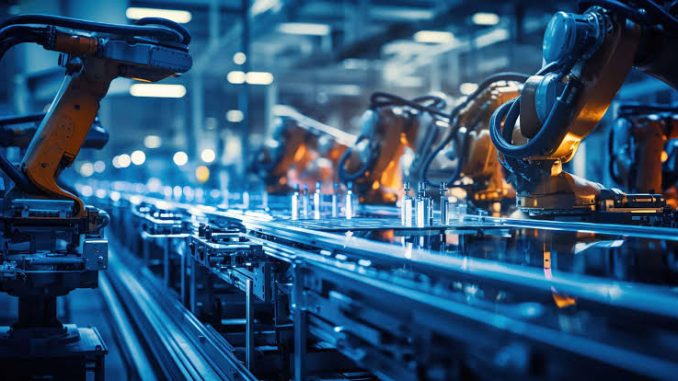
1. Artificial Intelligence (AI) and Machine Learning (ML)
Artificial intelligence and machine learning are revolutionizing industries from healthcare to finance and retail. AI algorithms are enhancing decision-making by analyzing vast amounts of data quickly and accurately. In healthcare, AI is helping in diagnosing diseases and personalizing treatment plans, while in finance, it’s being used for fraud detection and algorithmic trading. Retailers are using machine learning to provide personalized shopping experiences, recommend products, and optimize supply chains.
These technologies not only enable automation but also empower businesses to predict trends, customer behaviors, and optimize workflows in ways that were not possible before.
2. 5G Connectivity
5G is not just about faster internet—it’s about transforming how devices and machines communicate. With its ultra-low latency and high-speed data transfer, 5G is the backbone of the Internet of Things (IoT), autonomous vehicles, and smart cities. Industries such as manufacturing and logistics are leveraging 5G for real-time tracking, autonomous robots, and seamless communication between devices. It is also enabling telemedicine, where doctors can conduct surgeries remotely, and powering augmented and virtual reality applications.
In essence, 5G will enable a level of connectivity and efficiency that’s critical for the next wave of technological innovation.
3. Blockchain Technology
Blockchain is no longer just the technology behind cryptocurrencies like Bitcoin. Its ability to create secure, decentralized ledgers has made it invaluable in industries like finance, supply chain management, and healthcare. Blockchain’s transparency and security features are enabling industries to build trust and efficiency into their operations.
In supply chain management, it allows real-time tracking of goods from origin to destination, ensuring transparency and reducing fraud. In healthcare, blockchain can ensure the secure and private transfer of medical records between providers and patients. Its use in digital identity verification is also emerging as a critical application.
4. Quantum Computing
While still in its infancy, quantum computing has the potential to solve complex problems that are currently beyond the reach of even the most powerful classical computers. Industries that rely on large-scale computations, such as pharmaceuticals, aerospace, and cryptography, are eagerly anticipating quantum breakthroughs.
For instance, in drug discovery, quantum computing could simulate molecular structures at an unprecedented level of detail, potentially leading to cures for complex diseases. Financial institutions are also exploring quantum computing for risk analysis and portfolio optimization.
5. Robotics and Automation
Automation is no longer confined to factory floors. Advanced robotics and automation technologies are permeating industries such as healthcare, agriculture, and hospitality. In agriculture, robots are being used to plant and harvest crops, increasing productivity while reducing labor costs. In healthcare, surgical robots are performing complex procedures with greater precision than human hands alone.
Service industries like hospitality are also adopting automation, with robots performing tasks such as room service deliveries and housekeeping. The ability to automate repetitive tasks allows businesses to focus human resources on higher-level, creative, and strategic roles.
6. Augmented Reality (AR) and Virtual Reality (VR)
AR and VR are making waves in industries such as entertainment, real estate, and education. VR allows businesses to create immersive experiences for training, entertainment, and marketing. For example, real estate companies use VR to offer virtual tours of properties, while VR in education allows students to experience historical events or scientific phenomena in a highly interactive way.
AR, on the other hand, is finding applications in sectors like retail, where consumers can virtually try on clothes or see how furniture would look in their homes. In manufacturing and engineering, AR is being used to overlay instructions and data onto real-world equipment to improve training and maintenance processes.
7. Sustainable Energy Technologies
The push for sustainable energy solutions is transforming industries, particularly in energy production, transportation, and manufacturing. Innovations in solar, wind, and energy storage technologies are making renewable energy more viable and cost-effective. Electric vehicles (EVs) are reshaping the automotive industry, with advances in battery technology enabling longer ranges and faster charging times.
Sustainable energy technologies are also driving innovations in smart grids, enabling more efficient distribution and use of electricity. For industries, embracing these technologies not only reduces carbon footprints but also leads to cost savings in the long term.
8. Biotechnology and Genetic Engineering
Advances in biotechnology are transforming industries from agriculture to medicine. CRISPR, a powerful tool for editing genes, is enabling scientists to alter DNA with unprecedented precision. This is revolutionizing agriculture by creating crops that are more resistant to disease and environmental stress.
In healthcare, gene editing holds the potential to cure genetic disorders, while biopharmaceuticals and personalized medicine are improving patient outcomes. Biotechnology is also at the forefront of developing sustainable materials, such as lab-grown meat and bio-based plastics, which could drastically reduce the environmental impact of industries.
Conclusion
The top technologies reshaping industries today are not only improving efficiency but also opening up new possibilities and business models. From AI and 5G to blockchain and biotechnology, these innovations are setting the stage for a more connected, intelligent, and sustainable future. As industries continue to integrate these technologies, businesses that embrace innovation will be the ones that thrive in this ever-evolving landscape.